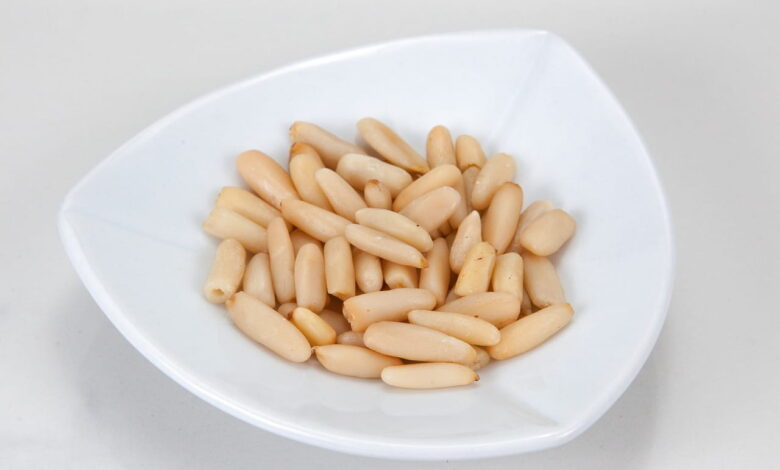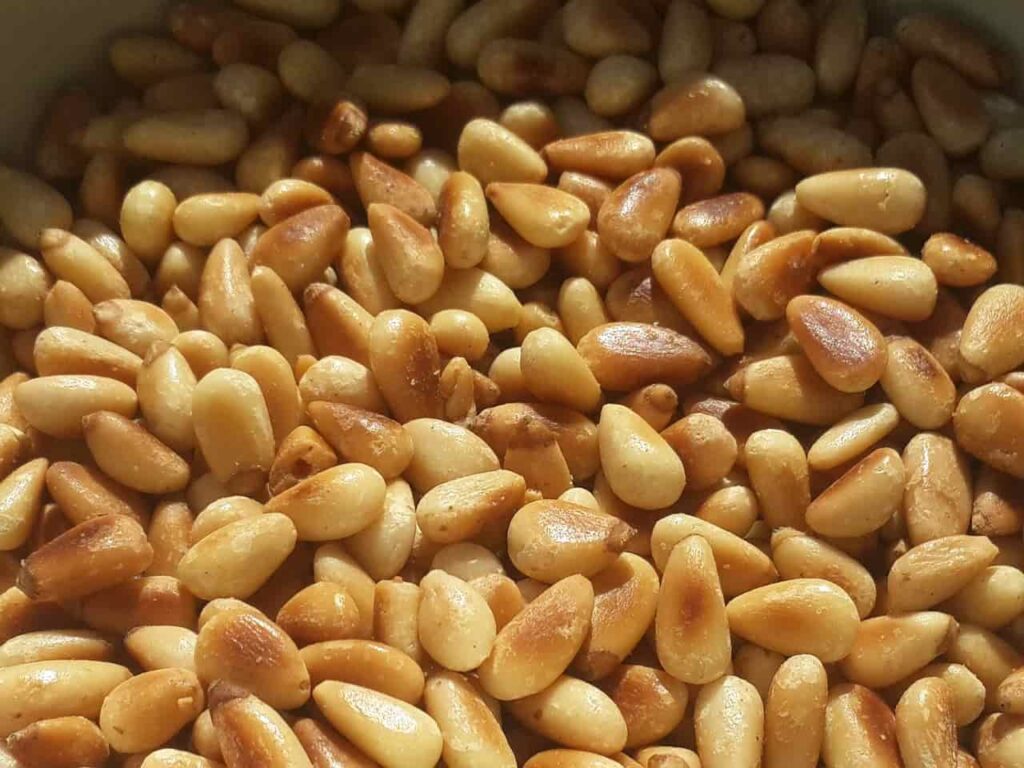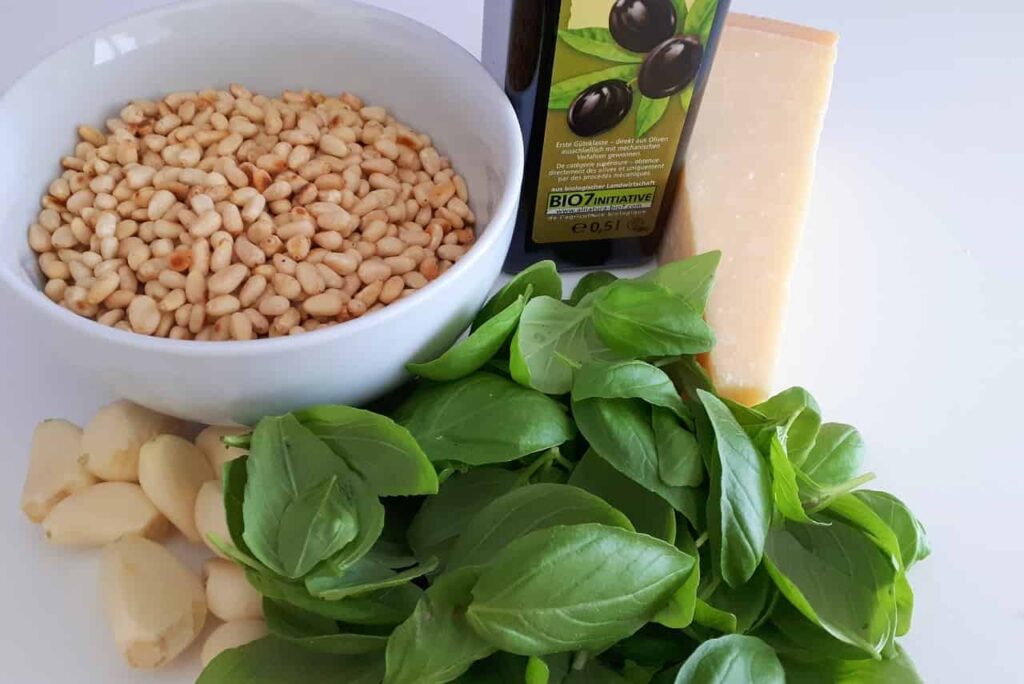Are Pine Nuts OK to Eat During Pregnancy? Are they Safe?

Pine nuts during pregnancy can be a unique and beneficial addition to a mother’s diet. Their mild and delicate flavor makes them an easy and versatile ingredient for various dishes. However, while pine nuts can be a nutritious choice, pregnant women should consume them in moderation and ensure they are properly stored and fresh to avoid any potential risks of foodborne illnesses.
What are Pine Nuts?

Pine nuts are small, edible seeds that come from pine cones. They are a unique and flavorful addition to various dishes and cuisines worldwide. These nuts have a buttery and delicate taste, making them a favorite in recipes ranging from salads and pesto to desserts like cookies and cakes. Pine nuts are rich in essential nutrients, including protein, healthy fats, vitamins, and minerals such as iron and magnesium. Due to their nutritional content and distinct taste, pine nuts are popular for cooking and snacking. Pine nuts are a versatile and enjoyable ingredient that adds a special touch to many culinary creations.
Is It Safe To Eat Pine Nuts During Pregnancy?
Pine nuts during pregnancy can be safe when consumed in moderation and with proper precautions. These small, edible seeds are a unique and nutritious addition to a pregnant woman’s diet. Pregnant women should ensure that their pine nuts are fresh and properly stored to avoid potential risks of foodborne illnesses.
Awareness of any allergies or sensitivities to nuts is also crucial, as some individuals may experience adverse reactions. To be safe, consulting with a healthcare provider before incorporating pine nuts into the diet during pregnancy is advisable. By doing so, expectant mothers can enjoy the benefits of these tasty nuts while ensuring a healthy and safe pregnancy journey.
How Much Pine Nuts Should I Eat a Day?
The amount of pine nuts you should eat daily depends on various factors, including your overall dietary plan, health status, and individual nutritional needs. While pine nuts can be a nutritious addition to your diet, they are calorie-dense, so it’s essential to consume them in moderation. A handful of pine nuts (about 1 to 2 tablespoons) per day is reasonable.
This allows you to enjoy their unique flavor and benefit from their nutrients. Be cautious and consult with a healthcare provider before incorporating pine nuts into your daily diet.
Benefits Of Pine Nuts During Pregnancy

1. Nutrient-rich
Pine nuts are packed with essential nutrients like protein, healthy fats, vitamins (such as vitamin E and B-complex vitamins), and minerals (including iron, magnesium, and zinc), promoting overall health during pregnancy.
2. Fetal development
The nutrients in pine nuts, particularly folic acid, contribute to healthy fetal development, reducing the risk of neural tube defects and ensuring proper growth.
3. Heart health
The monounsaturated fats in pine nuts can support heart health and help maintain healthy blood pressure levels during pregnancy.
4. Energy boost
Pine nuts are a good energy source, helping combat fatigue and supporting the increased energy demands during pregnancy.
4. Immune system support
The antioxidants in pine nuts strengthen the immune system, helping the body fight off infections and illnesses, which is particularly important during pregnancy.
5. Digestive Health
The dietary fiber in pine nuts aids in digestion and can alleviate common pregnancy-related digestive issues like constipation.
6. Brain Health
The presence of essential fatty acids like omega-3 in pine nuts contributes to the healthy development of the baby’s brain.
7. Muscle and tissue development
The protein content in pine nuts supports the development and repair of muscles and tissues, which is essential for the growing baby.
8. Blood production
The iron in pine nuts helps prevent anemia, a common concern during pregnancy, by supporting red blood cell production.
Best Time to Eat Pine Nuts During Pregnancy
The best time to eat pine nuts during pregnancy is whenever they are incorporated into a well-balanced and nutritious diet. Expectant mothers can enjoy the benefits of these tasty nuts by adding them to meals or snacks throughout the day. Pine nuts can be a unique and flavorful addition to various dishes, such as salads, pasta, or yogurt. Pregnant women should focus on consuming diverse nutrient-rich foods and listening to their bodies hunger and fullness cues. It’s essential to consult with a healthcare provider for personalized dietary recommendations during pregnancy.
Pine Nuts During Pregnancy, First, Second & Third Trimester
- First Trimester: Proper nutrition is crucial for the baby’s development during the first trimester. Pine nuts can provide essential nutrients like protein, healthy fats, and minerals, including folate, vital for early fetal development. Incorporating pine nuts into meals or snacks can help support the growth and development of the baby.
- Second Trimester: The second trimester is a period of rapid growth for the baby. Pine nuts can contribute to the baby’s development with their nutrient profile, protein for tissue growth, and overall health. They can be enjoyed in various recipes or as a healthy snack to ensure a well-rounded diet.
- Third Trimester: The baby’s growth continues in the third trimester, and the mother’s nutritional needs increase. Pine nuts can provide a good energy source, supporting the mother’s health and the baby’s growth. Including pine nuts in meals can help meet these increased nutritional requirements.
Pine Nuts Recipes

Here are Some delicious and nutritious pine nuts recipes that are suitable for pregnant women:
1. Spinach and Pine Nut Salad
A refreshing salad with baby spinach, cherry tomatoes, avocado, and toasted pine nuts, drizzled with a light lemon vinaigrette.
2. Pesto Pasta with Pine Nuts
A classic pasta dish featuring homemade basil pesto tossed with whole-grain pasta, cherry tomatoes, and pine nuts for added texture and flavor.
3. Quinoa and Roasted Vegetable Bowl
A wholesome and protein-rich bowl with roasted vegetables, cooked quinoa, feta cheese, and toasted pine nuts drizzled with a lemon-tahini dressing.
4. Stuffed Bell Peppers
Colorful bell peppers filled with a flavorful mixture of quinoa, sautéed vegetables, and pine nuts, baked to perfection.
5. Lemon Garlic Roasted Chicken with Pine Nuts
A savory and satisfying dish featuring tender roasted chicken infused with lemon and garlic flavors, topped with toasted pine nuts.
6. Pine Nut and Honey Granola Bars
Homemade granola bars are made with rolled oats, honey, dried fruits, and pine nuts for a nutritious and convenient snack.
7. Vegetarian Couscous Stuffed Zucchini
Zucchini boats filled with couscous, sautéed vegetables, chickpeas, and pine nuts, baked until tender and golden.
8. Pine Nut Crusted Salmon
A delightful and omega-3-rich salmon fillet coated with crushed pine nuts, baked to perfection and served with steamed vegetables.
Note: These recipes offer a variety of flavors and nutritional benefits, making them suitable choices for pregnant women looking to enjoy the unique taste and health benefits of pine nuts during their pregnancy journey. Pregnant women should always consult their healthcare provider for personalized dietary advice.
Nutrition of Pine Nuts
The nutritional profile of pine nuts per 100 grams:
| Nutrient | Amount per 100g |
|---|---|
| Calories | 673 kcal |
| Carbohydrates | 13.08 g |
| – Dietary Fiber | 3.7 g |
| – Sugars | 3.59 g |
| Fat | 68.37 g |
| Protein | 13.69 g |
| Vitamin E | 9.33 mg |
| Vitamin K | 53.9 mcg |
| Thiamin (B1) | 0.36 mg |
| Riboflavin (B2) | 0.16 mg |
| Niacin (B3) | 4.98 mg |
| Vitamin B6 | 0.094 mg |
| Folate (B9) | 34 mcg |
| Calcium | 16 mg |
| Iron | 5.53 mg |
| Magnesium | 251 mg |
| Phosphorus | 575 mg |
| Potassium | 597 mg |
| Zinc | 6.45 mg |
Side Effects and Precautions During Pregnancy
Side Effects:
- Morning Sickness: Nausea and vomiting, commonly known as morning sickness, can occur during the first trimester of pregnancy, making it essential to stay hydrated and eat small, frequent meals.
- Fatigue: Pregnancy hormones and the increased demands on the body can lead to fatigue, so getting enough rest and sleep is crucial.
- Swelling and Edema: Some women may experience swelling due to water retention, particularly in the feet and ankles. Staying hydrated and elevating the legs can help reduce swelling.
Precautions:
- Balanced Diet: Maintain a well-balanced diet rich in fruits, vegetables, whole grains, lean proteins, and healthy fats to meet the increased nutritional needs during pregnancy.
- Gentle Exercise: Engage in low-impact exercises approved by a healthcare provider to promote overall health and prepare for childbirth. Avoid strenuous activities that could put unnecessary stress on the body.
FAQ’s
Can I eat pine nuts during pregnancy?
Yes, you can eat pine nuts during pregnancy. They are a nutritious addition to your diet, providing essential nutrients like protein, healthy fats, and minerals that can benefit you and your developing baby.
Are pine nuts safe to eat raw during pregnancy?
It is generally recommended to consume pine nuts that have been properly roasted or toasted rather than eating them raw. Roasting helps eliminate potential contaminants and enhances their flavor.
Can pine nuts cause allergies during pregnancy?
Pine nuts can cause allergic reactions in some individuals, including pregnant women. If you have a history of nut allergies or allergic reactions to pine nuts, avoiding them during pregnancy is best.
How much pine nuts can I eat per day while pregnant?
Eating pine nuts in moderation is advisable, typically a handful (about 1 to 2 tablespoons) per day. As they are calorie-dense, consuming them excessively may lead to unwanted weight gain.
Are there any specific benefits of pine nuts during pregnancy?
Yes, pine nuts offer various benefits during pregnancy, including being a good source of protein, healthy fats, and essential minerals like iron and magnesium, supporting overall health and fetal development.
Can pine nuts help with morning sickness during pregnancy?
While pine nuts may not directly help with morning sickness, they are a nutritious food option that can be included in a well-balanced diet to manage pregnancy-related nausea.
Can pine nuts help prevent constipation during pregnancy?
Yes, the dietary fiber content in pine nuts can aid in preventing constipation, which is a common concern during pregnancy. It’s essential to combine them with other fiber-rich foods and stay hydrated for better results.
Can I include pine nuts in homemade pesto while pregnant?
Yes, you can include pine nuts in homemade pesto during pregnancy. Use fresh, properly stored pine nuts and maintain good food safety while preparing your pesto sauce.
Are there any precautions to take when eating pine nuts during pregnancy?
Pregnant women should be cautious of potential allergies to nuts, ensure pine nuts are fresh and properly stored, and consume them as part of a well-balanced diet.
Should I consult my healthcare provider before adding pine nuts to my pregnancy diet?
It is recommended to consult your healthcare provider before making any significant dietary changes during pregnancy, including adding pine nuts to your meals. Your healthcare provider can provide personalized advice and address specific concerns based on your health and nutritional needs.
Conclusion: Lady Well Care has been an indispensable part of the journey right from the start. We provide captivating and reliable fitness, culinary, and nourishment content designed exclusively for women. Our commitment to consulting certified healthcare experts ensures you prioritize your overall health during pregnancy and post-abortion. Your well-being is our utmost priority, and we are dedicated to guiding you toward a healthier, happier you!
Explore our Homepage, where you’ll discover personalized articles meticulously curated to match your unique interests.




